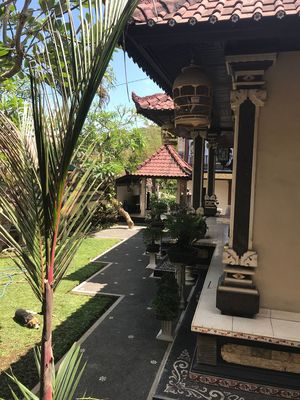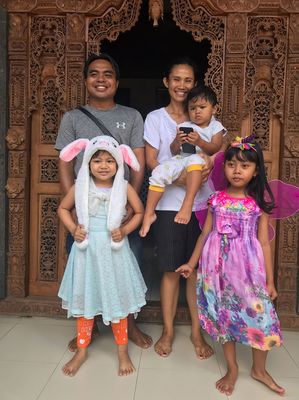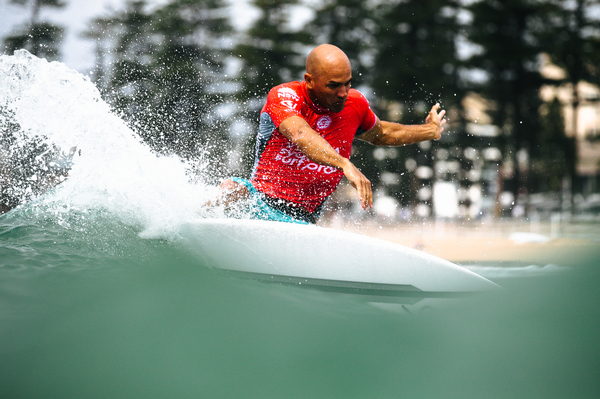Last weekend we paid a long overdue visit to our friends Wayan Agus Parwita and his wife Made at the family compound in the charming village of Cepaka, about 15 minutes inland from where we live in Bali.
Wow! What a change at the Parwita household! Six years ago Shaun Cairns and I filmed a sequence at the compound for inclusion in a short film we were making to promote my book, Bali Heaven and Hell, when it was a typical Balinese cluster of rooms around a central courtyard with a family temple at one end. Although I always see Wayan Agus and sometimes Made when I go to Bali, it had been some years since I’d visited them at Cepaka, and the changes are not only remarkable but symptomatic of the lightning fast rise of the middle class on this island full of smart businesses, vape shops and tattoo parlours that now has to import rice from its less-developed neighbours.
When I first met Wayan Agus a decade or so ago, he was in his late 20s, newly married and driving the family car for a living. Although he was our friend Sue’s designated driver, in her long absences he also became mine, driving me to all parts of the island on many visits over two years, often doubling up as translator and cultural interpreter while I researched my Bali book. And while he drove, he shared his life story.
Although his mother, Ni Luh Suji, only did two years’ schooling and never worked, his father Nyoman trained as a wood carver, first doing temple work for a pittance, but moving into the tourist market later. The family prospered as Nyoman sold more and more carvings, and by the time Wayan was old enough to learn carving himself, his father had moved to a big new hotel in Seminyak, and set Wayan up in another hotel every afternoon after school, where the eager boy practiced his English and got a first taste for business.
Nyoman invested his savings in motor bikes that he could rent to tourists, and by the time Wayan went to university, he had worked out that he would need to buy two more bikes and get them working in order to put Wayan’s younger brother, I Made Dwipayana, through chefs’ school. The family still tended pigs and lived at the edge of a rice field, but in the space of a generation they had successfully made the transition from subsistence agriculture to tourism entrepreneurs.
Then the bombs went off in Kuta. Wayan Agus, then 23, a recent graduate of Bali Polytechnic’s diploma course in tourism and hotel management, knocked off early from his job as a manager at the Coral Reef bar and restaurant just a couple of hundred metres from the Sari Club, and was halfway home to Cepaka when the 2002 terrorist attacks devastated Kuta. While he was spared physical injury, the emotional scars would last a decade.
As I write this, I’m listening to one of the many tapes I made of our conversations years ago:
“When the phones came back on in the late afternoon, I started to get phone calls from my friends. ‘Wayan, you still alive?’ By night time our boss had called us back to the restaurant, not to open it but to make sure everybody was okay and had somewhere safe to stay. It was very dark in Kuta that night, and quiet. No cars, no lights, no people. Everyone was crying. I sat in the dark and cried too.”
Nyoman’s three hotels were suddenly empty of tourists and he stopped showing his carvings. He started to sell the motor bikes one by one to keep food on the table. The important thing was to keep young Made in college. Wayan Agus eventually found work on the Carnival Cruise Line, doing seven-month stints without break in the Caribbean. He was paid $US70 a fortnight and had to buy his own airline tickets to and from the departure port, but the cabin boys received free meals and a bed, and the passengers were generous tippers. Soon Wayan was regularly sending home money to the compound.
Between his fourth and fifth contracts with Carnival Cruises, Wayan fell in love with pretty Made, and missed her so much that he jumped ship when the cruiser made port, quit his job and flew home. Fortunately, the tourist economy at home had finally picked up, and then terrorists struck again.
But Wayan Agus persevered. He was a hard worker and a smart thinker, and by the time I met him, he had planned a future, and it wasn’t driving tourists.
Wayan Agus turns 40 this year, and he and Made now have three gorgeous children, and he is the busiest man in Cepaka, running a business empire that includes several restaurants, a string of commercial and residential rental properties and the family bakery, run by younger brother Made, one of Bali’s most distinguished pastry chefs. The bakery forms one end of the now-huge family compound, and beyond it the family landholding stretches down to a beautiful river.
Dad Nyoman rises at 4am each day to package the bread and pastries made by the night shift, ready for cousin Ketut to make the deliveries to restaurants all over South Bali. Wayan Agus spends his long days driving between construction sites, his phone attached to his ear despite my warnings. I wish he’d slow down a bit, but I’m enormously proud of him.









